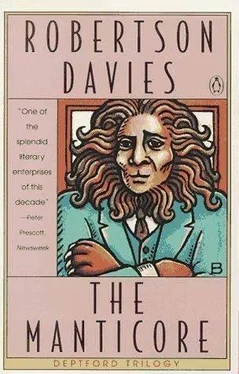It was during this time, too, that I became financially independent of my father. He had been making a man of me, so far as a tight check on my expenditures would do it; his training was effective, too, for I am a close man with money to this day, and have never come near to spending my income, or that part of it taxation allows me to keep. My personal fortune began quite unexpectedly when I war twenty-one.
Grandfather Staunton had not approved of Father, who had become what the old man called a "high-flyer", and although he left him a part of his estate, he left half of it to Caroline, in trust. To me he left what Father regarded as a joke legacy, in the form of five hundred acres of land in Northern Ontario, which he had bought as a speculation when it was rumoured that there was coal up there. Coal there may have been, but as there was no economically sane way of getting it down to places where it could be sold, the land lay idle. Nobody had ever seen it, and it was assumed that it was a wilderness of rock and scrub trees. Grandfather's executor, which was a large trust company, did nothing about this land until my majority, and then suggested that I sell it to a company which had offered to buy it for a hundred dollars an acre; there was fifty thousand dollars to be picked up for nothing, so to speak, and they advised me to take it.
I was stubborn. If the land was worthless, why did anyone want to pay a hundred dollars an acre for it? I had a hunch that I might as well see it before parting with it, so I set off to look at my inheritance. I am no woodsman, and it was a miserable journey from the nearest train-stop to my property, but I did it by canoe, in the company of a morose guide, and was frightened out of my wits by the desolation, the dangers of canoeing in some very rough water, and the apparent untrustworthiness of my companion. But after a couple of days we were on my land, and as I tramped around it I found that there were other people on it, too, and that they were unmistakably drilling for minerals. They were embarrassed, and I became thoughtful, for they had no authority to be doing what they were doing. Back in Toronto I made a fuss with the trust company, who knew nothing about the drillers, and I made something more than a fuss to the mining company. So after some legal huffing and puffing, and giving them the Pargetter treatment, I disposed of my northern land at a thousand dollars an acre, which would have been dirt cheap if there had been a mine. But there was nothing there, or not enough. I emerged from this adventure with half a million dollars. A nice, round sum surely never foreseen by Grandfather Staunton.
Father was not pleased, because the trust company who had been so casual about my affairs was one of which he was a director, and at one point I had threatened to sue them for mismanagement, which he considered unfilial. But I stuck to my guns, and when it was all over asked him if he would like me to move out of the family house. But he urged me to stay. It was large, and he was lonely when his political career allowed him to be there, and so I stayed where I was and thus came once again under the eye of Netty.
Netty was the survivor of an endless train of servants. She had never been given the title of housekeeper, but she was the Black Pope of the domestic staff, never frankly tattling but always hinting or wearing the unmistakable air of someone who could say a great deal if asked. With no children to look after, she had become almost a valet to Father, cleaning his clothes and washing and ironing his shirts, which she declared nobody else could do to his complete satisfaction.
When I had finished my Canadian legal studies I gave offence to Father once again, for he had always assumed that I would be content to have him find a place for me in the Alpha Corporation. But that was not at all my plan; I wanted to practise as a criminal lawyer. Pargetter, with whom I kept in constant touch (though he never raised me to the level of one of his long-distance chess opponents) urged me to get some general practice first, and preferably in a small place. "You will see more of human nature, and get a greater variety of experience, in three years in a country town than you will get in five years with a big firm in a city," he wrote. So once again I returned, not to Deptford, but to the nearby county town, a place of about sixty thousand people, called Pittstown. I easily got a place in the law office of Diarmuid Mahaffey, whose father had once been the lawyer in Deptford and with whom there was a family connection.
Diarmuid was very good to me and saw that I got a little work of every kind, including a few of those mad clients all lawyers seem to have if their practice extends into the country. I don't suggest that city lawyers have no madmen on their books, but I honestly believe the countryside breeds finer examples of the paranoia querulans , the connoisseurs of litigation. He bore in mind that I wanted to work in the courts and put me in the way of getting some of those cases on which most young lawyers cut their teeth; some indignant or incompetent accused person needs a lawyer, and the court appoints a lawyer, usually a young man, to act for him.
I learned a valuable lesson from my first case of this kind. A Maltese labourer was charged with indecent assault; it was not a very serious matter, because the aspiring rapist had trouble with his buttons, and the woman, who was considerably bigger than he, hit him with her handbag and ran away. "You must tell me honestly," said I, "did you do it? I'll do my best to get you off, but I must know the truth." "Meester Stown," said he, with tears in his eyes, "I swear to you on the grave of my dead mother, I never did no such dirty thing. Spit in my mouth if I even touch this woman!" So I gave the court a fine harangue, and the judge gave my client two years. My client was delighted. "That judge, he's very clever man," he said to me afterward; "he knew all the time I done it." Then he shook my hand and trotted off with the warder, pleased to have been punished by such an expert in human nature. I decided then that the kind of people with whom I had chosen to associate myself were not to be trusted, or at least not taken literally.
My next serious case was a far bigger thing, nothing less than a murderess. Poor woman, she had shot her husband. He was a fanner, known far and wide to be no good and brutal to her and his livestock, but he was decisively dead; she had poked a shotgun through the back window of the privy while he was perched on the seat and blown his head off. She made no denial, and was indeed silent and resigned through all the preliminaries. But they still hanged women in those days, and it was my job to save her from the gallows if I could.
I spent a good deal of time with her and thought so much about the case that Diarmuid began to call me Sir Edward, in reference to Marshall Hall. But one night I had a bright idea, and the next day I put a question to my client and got the answer I expected. When at last the case came to trial I spoke of extenuating circumstances, and at the right moment said that the murdered man had repeatedly beaten his wife in order to make her perform fellatio .
"Know your judge" was one of Diarmuid's favourite maxims; of course no barrister knows a judge overtly, but most of the Bar know him before he is elevated to the Bench and have some estimate of his temperament. Obviously you don't take a particularly messy divorce before a Catholic judge, or a drunk who has caused an accident before a teetotal judge, if you can help it. I was lucky in this case because our assize judge that season was Orley Mickley, known to be a first-rate man of the law, but in his private life a pillar of rectitude and a great deplorer of sexual sin. As judges often are, he was innocent of things that lesser people know, and the word fellatio had not come his way.
Читать дальше












